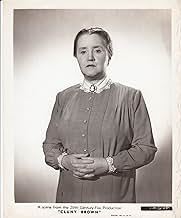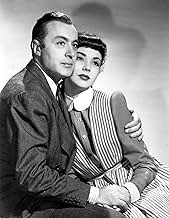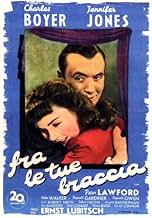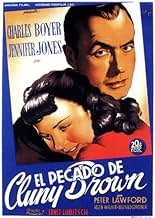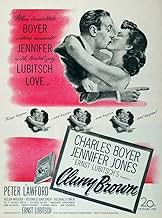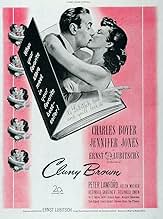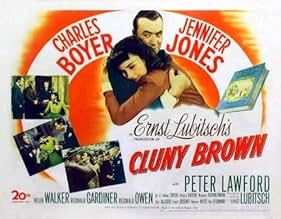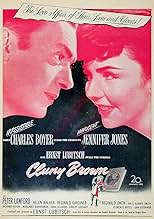NOTE IMDb
7,4/10
4,4 k
MA NOTE
Une femme de chambre ouverte d'esprit et un réfugié tchèque surprennent un village anglais avec leurs manières non conventionnelles.Une femme de chambre ouverte d'esprit et un réfugié tchèque surprennent un village anglais avec leurs manières non conventionnelles.Une femme de chambre ouverte d'esprit et un réfugié tchèque surprennent un village anglais avec leurs manières non conventionnelles.
- Réalisation
- Scénario
- Casting principal
- Récompenses
- 3 victoires au total
C. Aubrey Smith
- Col. Charles Duff Graham
- (as Sir C. Aubrey Smith)
Norman Ainsley
- Mr. Tupham
- (non crédité)
Billy Bevan
- Uncle Arn Porritt
- (non crédité)
Whit Bissell
- Archie
- (non crédité)
Bette Rae Brown
- Girl at Party
- (non crédité)
Charles Coleman
- Constable Birkins
- (non crédité)
Avis à la une
Ernest Lubitsch used the charms and abilities of his leads Charles Boyer and Jennifer Jones to get some maximum performances out of them and make his next to last film Cluny Brown a great success. I've not heard that Lubitsch had to contend with Jennifer's husband and Svengali David O. Selznick on the set, but it's a safe bet they clashed because Selznick could not help interjecting himself where his wife was concerned.
Jones is the daughter of English plumber Billy Bevan and the most interesting thing is that in this English setting her non-English speech pattern is perfectly acceptable even against Bevan's cockney accent. Jones was also perfectly acceptable in another English part in Love Letters and certainly got no criticism. The camera always loved Jennifer Jones and in parts like Cluny Brown as the girl next door she lit up the screen.
Boyer as often as not played a whole lot of European types not necessarily French. Here he's a Czech refugee over in the United Kingdom fleeing from Mr. Hitler. The film is set in Neville Chamberlain Great Britain and Boyer is one of many bringing unpleasant news to the British public.
After Bevan rescues Jones from Boyer and Reginald Gardiner Jones is placed as a maid at a country estate where she meets Boyer again. There should be some class barriers, but Boyer breaks them down and Jones is more than agreeable.
Lots of agreeable Lubitsch touches and a minimum of Selznick interference make Cluny Brown still a treat after over 60 years.
Jones is the daughter of English plumber Billy Bevan and the most interesting thing is that in this English setting her non-English speech pattern is perfectly acceptable even against Bevan's cockney accent. Jones was also perfectly acceptable in another English part in Love Letters and certainly got no criticism. The camera always loved Jennifer Jones and in parts like Cluny Brown as the girl next door she lit up the screen.
Boyer as often as not played a whole lot of European types not necessarily French. Here he's a Czech refugee over in the United Kingdom fleeing from Mr. Hitler. The film is set in Neville Chamberlain Great Britain and Boyer is one of many bringing unpleasant news to the British public.
After Bevan rescues Jones from Boyer and Reginald Gardiner Jones is placed as a maid at a country estate where she meets Boyer again. There should be some class barriers, but Boyer breaks them down and Jones is more than agreeable.
Lots of agreeable Lubitsch touches and a minimum of Selznick interference make Cluny Brown still a treat after over 60 years.
... and the dialogue is just extraordinary.
Cluny Brown (Jennifer Jones) is a young English woman trying to find her place in life. She is quirky, outspoken, and she likes plumbing, mainly from watching her uncle be a plumber for years.
But she has to deal with the snobbery of all of the classes - the middle class represented in a village druggist, the servant class in the head servants in the house she works in, and the rich class. Since films of the time so often made fun of the rich, this one takes a different tack. The rich people are just agog over Czech intellectual and refugee Adam Belinski. They trip over themselves giving him money because it makes them feel like they are being a patron.
Cluny makes people uncomfortable because she does things that make her visible, when it seems that people want her to just disappear into the woodwork, to have no opinion or personality at all, including the village druggist who is considering marrying her. Belinski appreciates her fire and forwardness. He has a similar temperament, but because he is a man and an intellectual, nobody seems to mind the same behavior out of him.
I never cared for Peter Lawford in all of those collegiate MGM musical film roles, but here he is hilarious as the idealist son of a nobleman who is being treated badly by his steady girlfriend, Betty (Helen Walker), who refuses to give him clear signals as to where he stands.
Cluny Brown (Jennifer Jones) is a young English woman trying to find her place in life. She is quirky, outspoken, and she likes plumbing, mainly from watching her uncle be a plumber for years.
But she has to deal with the snobbery of all of the classes - the middle class represented in a village druggist, the servant class in the head servants in the house she works in, and the rich class. Since films of the time so often made fun of the rich, this one takes a different tack. The rich people are just agog over Czech intellectual and refugee Adam Belinski. They trip over themselves giving him money because it makes them feel like they are being a patron.
Cluny makes people uncomfortable because she does things that make her visible, when it seems that people want her to just disappear into the woodwork, to have no opinion or personality at all, including the village druggist who is considering marrying her. Belinski appreciates her fire and forwardness. He has a similar temperament, but because he is a man and an intellectual, nobody seems to mind the same behavior out of him.
I never cared for Peter Lawford in all of those collegiate MGM musical film roles, but here he is hilarious as the idealist son of a nobleman who is being treated badly by his steady girlfriend, Betty (Helen Walker), who refuses to give him clear signals as to where he stands.
"Cluny Brown" had quite an impact on me when I saw part of it as a child. I'm sure my feelings had to do with the luminous beauty of Jennifer Jones and wanting to be just like her when I grew up.
Jones has the title role of an imaginative young woman who, being the niece of a plumber, doesn't mind picking up a hammer herself once in a while and having a good whack at the pipes. It gets her into some trouble at the apartment of Hilary Ames (Reginald Sinclair) when she arrives before a party to clear out his sink before his guests arrive.
There she meets Adam Belinski, a Czech academician who's on the run from Hitler. Well, that's who the very earnest Andrew Carmel (Peter Lawford) assumes he is...Belinski never actually says.
When her uncle finds Cluny drunk and on the couch at the Ames apartment, he puts her into service. She winds up working at the Carmel country estate, where Belinski comes to stay.
Attracted to her, he sets about aggravating the local pharmacist, Mr. Wilson (Richard Haydn) who is courting Cluny, and getting involved with Andrew's romance with Betty Cream (Helen Walker).
This is a very sweet, light comedy from Lubitsch that touches on not only the class system in England but the attitude of the upper class toward the impending war. As in the Fox film "This Above All," the upper class in "Cluny Brown" seems annoyed by the mere thought of war and hope the nonsense will just go away. As for Cluny, born to her class, she's expected to work and behave a certain way, though it isn't really her nature.
The performances are all very good, with Boyer a delight as Belinski, a character perhaps modeled on the Czech freedom fighter Jan Mazurek - though he basically doesn't act in danger or worried and manages to hit Andrew up for money. One is never really sure throughout the film what he's up to.
Richard Haydn is hilarious as Cluny's suitor Mr. Wilson, one of the best scenes taking place when he plays the harmonium for her and she all but swoons. As his mother, all Una O'Connor does is cough, but that's all she needs to do.
Playing opposite boyish Peter Lawford, Helen Walker seemed too old for the part of Betty. The other supporting players are all excellent, including Sara Allgood, Reginald Owen, and Margaret Bannerman.
David O. Selznick saw Jennifer Jones in his outer office, and it was love at first sight. It's easy to see why. She is radiant and spirited as Cluny, her vivid imagination shining through her eyes and smile. A wonderful presence - gentle, vulnerable, and guileless.
"Cluny Brown" isn't at the top of Lubitsch's best - it's uneven and doesn't have enough of a plot. It's entertaining nonetheless, and the ending is pure joy.
Jones has the title role of an imaginative young woman who, being the niece of a plumber, doesn't mind picking up a hammer herself once in a while and having a good whack at the pipes. It gets her into some trouble at the apartment of Hilary Ames (Reginald Sinclair) when she arrives before a party to clear out his sink before his guests arrive.
There she meets Adam Belinski, a Czech academician who's on the run from Hitler. Well, that's who the very earnest Andrew Carmel (Peter Lawford) assumes he is...Belinski never actually says.
When her uncle finds Cluny drunk and on the couch at the Ames apartment, he puts her into service. She winds up working at the Carmel country estate, where Belinski comes to stay.
Attracted to her, he sets about aggravating the local pharmacist, Mr. Wilson (Richard Haydn) who is courting Cluny, and getting involved with Andrew's romance with Betty Cream (Helen Walker).
This is a very sweet, light comedy from Lubitsch that touches on not only the class system in England but the attitude of the upper class toward the impending war. As in the Fox film "This Above All," the upper class in "Cluny Brown" seems annoyed by the mere thought of war and hope the nonsense will just go away. As for Cluny, born to her class, she's expected to work and behave a certain way, though it isn't really her nature.
The performances are all very good, with Boyer a delight as Belinski, a character perhaps modeled on the Czech freedom fighter Jan Mazurek - though he basically doesn't act in danger or worried and manages to hit Andrew up for money. One is never really sure throughout the film what he's up to.
Richard Haydn is hilarious as Cluny's suitor Mr. Wilson, one of the best scenes taking place when he plays the harmonium for her and she all but swoons. As his mother, all Una O'Connor does is cough, but that's all she needs to do.
Playing opposite boyish Peter Lawford, Helen Walker seemed too old for the part of Betty. The other supporting players are all excellent, including Sara Allgood, Reginald Owen, and Margaret Bannerman.
David O. Selznick saw Jennifer Jones in his outer office, and it was love at first sight. It's easy to see why. She is radiant and spirited as Cluny, her vivid imagination shining through her eyes and smile. A wonderful presence - gentle, vulnerable, and guileless.
"Cluny Brown" isn't at the top of Lubitsch's best - it's uneven and doesn't have enough of a plot. It's entertaining nonetheless, and the ending is pure joy.
I loved this movie. Charles Boyer is always such a smooth actor. Im a sucker for a French accent. It was simple movie with a simple plot. Jennifer Jones was cute in the movie but not the best acting I've seen her do. I really liked her character though. I've watched this movie about 15 times and I cant really explain why, except that it makes me feel good. This is the kind of movie you want to watch if its a rainy, cold day outside and you can curl up with a cup of cocoa. The cocoa will warm your insides and the movie Cluny Brown will warm your heart. I will always treasure this sweet simple romantic comedy. Keep in mind that this is a very old movie and the purpose was for entertainment back then, not detailed plot twists. I think that this movie is worth watching, but don't stop after the first 15 minutes, it does get better. Just watch it!!!Trust me!!
The Lubitsch Touch is evident in this witty, intelligent film. Jennifer Jones shows a vivacity and humor she had never displayed before and would not again until her clever performance in "Beat The Devil". In one amazing scene where she cannot resist showing her wares as a Plumber (to the disdain of the other party guests) she gets to play a reaction to the debacle that is amazing in its combination of pathos and hilarity. Very interesting character actors including a very, very funny Una O'Connor (whose dialogue consists mainly of incessantly clearing her throat), the light as a feather and dead on playing of Margaret Bannerman, and also a chance to see Helen Walker. Charles Boyer plays with his customary light touch and is the anchor to this film, but finally it is Jennifer Jones' performance that takes one breath away and stays with you long after you've seen it.
Le saviez-vous
- AnecdotesThis was the last film director Ernst Lubitsch completed himself. He died the following year during the filming of La Dame au manteau d'hermine (1948).
- GaffesWhen Cluny and Adam and Hilary are in Hilary's living room, just after Cluny says "It's so wonderful to be a cat and read the Daily Mail," the boom mic can be seen in the mirror above Adam's head.
- Citations
Adam Belinski: In Hyde Park, for instance, some people like to feed nuts to the squirrels. But if it makes you happy to feed squirrels to the nuts, who am I to say, "nuts to the squirrels?"
- ConnexionsEdited into I Love Lucy: The Fox Hunt (1956)
Meilleurs choix
Connectez-vous pour évaluer et suivre la liste de favoris afin de recevoir des recommandations personnalisées
- How long is Cluny Brown?Alimenté par Alexa
Détails
Box-office
- Montant brut mondial
- 17 155 $US
- Durée1 heure 40 minutes
- Couleur
- Rapport de forme
- 1.37 : 1
Contribuer à cette page
Suggérer une modification ou ajouter du contenu manquant

Lacune principale
By what name was La folle ingénue (1946) officially released in India in English?
Répondre

